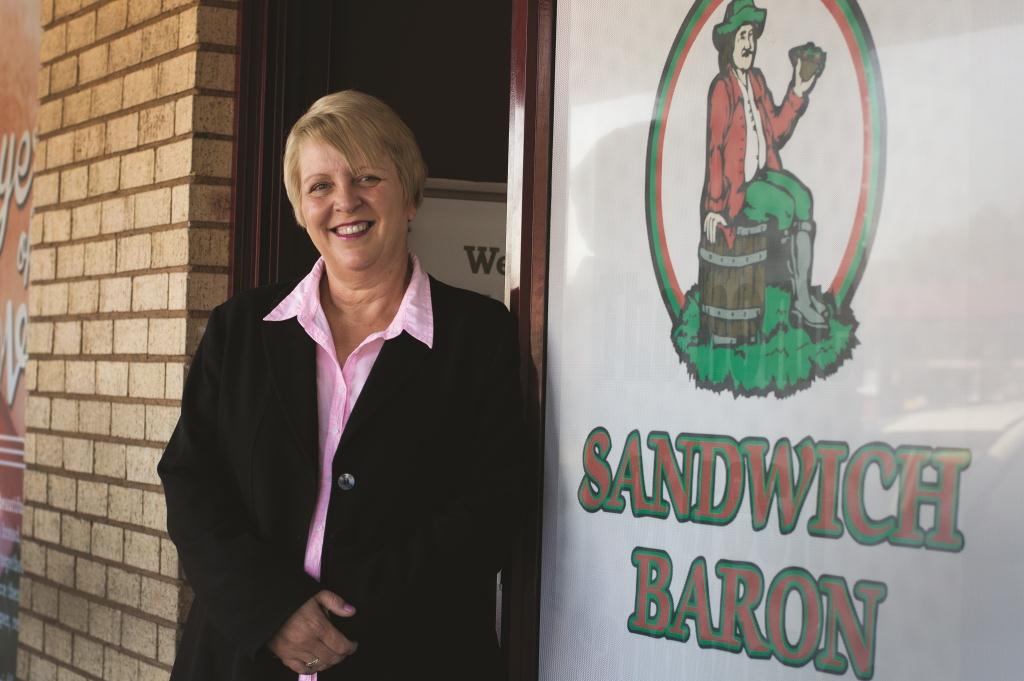Born in Zimbabwe to British parents, Sally J’Arlette-Joy moved to London at the age of 16, during the years of political unrest in Zimbabwe. In London, she worked as a legal secretary and DJ, and met her comedian husband. The pair soon moved to South Africa after falling in love with the country during a visit.
Thereafter, they opened an entertainment restaurant called Stars but J’Arlette-Joy sold it after her husband took off with a young waitress. She had had enough of the food industry, and decided to take a year off work.
As life happens, she was forced out of retirement in 1996, when she realized she only had R5,000 ($420) left in her bank account. Sandwiches seemed the obvious choice to her as she had stopped to grab one every day on the way to work, while living in London. She remembers occasionally treating herself to a crispy French bread stuffed with tuna, mayonnaise and fresh salad.
Using R1,000 ($84), she worked from home, typing up a small menu and distributing it. It wasn’t long until she got her first call. With word of mouth working for her, she couldn’t cope on her own and hired her first employee, two weeks into the business.
With success comes scrutiny. Someone tipped off the health inspector and she was told she could no longer sell food from home. With no other choice, J’Arlette-Joy rented a shop using the money she had left. It had nothing but a table, fridge, desk and telephone. Using her credit card she bought an old Honda motorbike for deliveries.
Loading...
“Whoever reported me helped me because my business more than doubled,” says J’Arlette-Joy.

After a year in business, a woman approached J’Arlette-Joy looking to buy a franchise. She was turned away but more followed, at this point J’Arlette-Joy had three stores.
Eventually intrigued by the franchising idea, J’Arlette-Joy got reading material from the Franchise Association of South Africa but admits she put the idea on the back burner when the books didn’t make any sense to her. With growing demand and constant enquiries in the next couple of years, J’Arlette-Joy had to dig in and read so she could write her operating manual.
It was in 2002 that she sold her store in Germiston as the first franchise. Nineteen years and more than 50 stores later, her business, Sandwich Baron, is booming, and J’Arlette-Joy says she never thought she would have so many stores.
Her business strategy was simple, stressing quality and freshness. All the ingredients are cut to order. There are regular check-ups on the stores to maintain quality control. J’Arlette-Joy interviews potential franchisees personally, preferring owner-run stores, where the owners risk their own money. The franchise also goes against what is considered the norm, shying away from large malls because of the higher rent.
Thirty percent of the business comes from functions, about 10% from the stores leaving the rest to delivery orders. This is why it’s not uncommon for a large store to have 14 drivers.
J’Arlette-Joy admits she has never felt any competition in her particular market. The initial cost of a franchise is R575,000 ($48,345), excluding VAT, and returns are said to be R21,000 ($1,765) per R100,000 ($8,407). J’Arlette-Joy is up for expansion but trying a couple of new things. She has sold a master license for 45 stores in Soweto and funded the first one herself.
“We’re more of a sandwich factory than shop,” she says.
“Once the Soweto store is established, I will look into opening more in the townships.”
J’Arlette-Joy is hands-on with her business, personally owning two stores in the franchises’ top five.
The company is also launching a new tuck-shop initiative using staff members that have been around for five to six years. Each shop will take R100,000 ($8,407) to set up. The key is convincing the schools to allow it.
“I already have two successful tuck shops in private schools and have empowered a manager of mine who has worked for me for eight years into one of them,” says J’Arlette-Joy.
“She takes very good care of her franchisees; she believes in true partnership with them and she doesn’t try to be a dictator,” Jacques Taljaard, now former development manager at Sandwich Baron, once told CNBC Africa.
J’Arlette-Joy is not looking to retire anytime soon. She has two sons waiting to take over but says they must learn to run their own shops first and even then they may not be ready.
Her parting words to aspiring entrepreneurs are clear: “To be successful you have to really believe in your business. If you think you will fail, you surely will.”
Loading...
